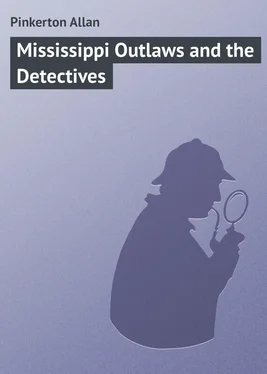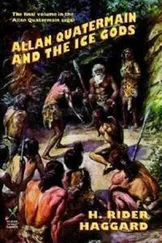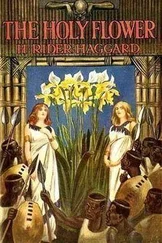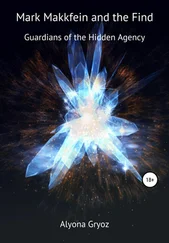Allan Pinkerton - Mississippi Outlaws and the Detectives
Здесь есть возможность читать онлайн «Allan Pinkerton - Mississippi Outlaws and the Detectives» — ознакомительный отрывок электронной книги совершенно бесплатно, а после прочтения отрывка купить полную версию. В некоторых случаях можно слушать аудио, скачать через торрент в формате fb2 и присутствует краткое содержание. Жанр: Классический детектив, foreign_detective, foreign_prose, foreign_language, на английском языке. Описание произведения, (предисловие) а так же отзывы посетителей доступны на портале библиотеки ЛибКат.
- Название:Mississippi Outlaws and the Detectives
- Автор:
- Жанр:
- Год:неизвестен
- ISBN:нет данных
- Рейтинг книги:3 / 5. Голосов: 1
-
Избранное:Добавить в избранное
- Отзывы:
-
Ваша оценка:
- 60
- 1
- 2
- 3
- 4
- 5
Mississippi Outlaws and the Detectives: краткое содержание, описание и аннотация
Предлагаем к чтению аннотацию, описание, краткое содержание или предисловие (зависит от того, что написал сам автор книги «Mississippi Outlaws and the Detectives»). Если вы не нашли необходимую информацию о книге — напишите в комментариях, мы постараемся отыскать её.
Mississippi Outlaws and the Detectives — читать онлайн ознакомительный отрывок
Ниже представлен текст книги, разбитый по страницам. Система сохранения места последней прочитанной страницы, позволяет с удобством читать онлайн бесплатно книгу «Mississippi Outlaws and the Detectives», без необходимости каждый раз заново искать на чём Вы остановились. Поставьте закладку, и сможете в любой момент перейти на страницу, на которой закончили чтение.
Интервал:
Закладка:
Very shortly after the Union City robbery, a letter was received from a man in Kansas City, calling himself Charles Lavalle. The writer claimed that he had been with the gang who had robbed the train, but that they had refused to divide with him, and so, out of revenge, he was anxious to bring them to punishment. He claimed further that he was then in the confidence of another party, who were soon going to make another raid upon the express company somewhere between New Orleans and Mobile.
The plausibility of his story was such that he obtained quite a large sum from the express company to enable him to follow up and remain with the gang of thieves with whom he professed to be associated. No news was received from him, however, and at length I was requested to put a "shadow" upon his track. My operative followed him to St. Joseph, Missouri, and thence to Quincy, Illinois, but, during two weeks of close investigation, no trace of the villains in Lavalle's company could be found, and he was never seen in the society of any known burglars or thieves. It was soon evident that he was playing upon the express company a well-worn confidence game, which has been attempted probably every time a large robbery has occurred in the last fifteen years. He became very importunate for more money while in Quincy, as he stated that the gang to which he belonged were ready to start for New Orleans; but, finding that his appeals were useless, and that no more money would be advanced until some of his party were actually discovered and trapped through his agency, he soon ceased writing.
The foregoing are only a few of the instances in which our attention was diverted from the real criminals; and, although the efforts of my operatives were rarely misdirected in any one affair for any length of time, still these false alarms were always a source of great annoyance and embarrassment.
CHAPTER III
"Old Hicks," a drunken Planter, is entertained by a Hunting-party. – Lester's Landing. – Its Grocery-store and Mysterious Merchants. – A dangerous Situation and a desperate Encounter. – The unfortunate Escape of Two of the Robbers.
One of the most direct sources of information relative to the party was found in the person of an old planter, named Hicks, who lived some distance down the track of the railroad. He was in the habit of visiting Union City very frequently, and he usually rounded off his day's pleasure by becoming jovially drunk, in which condition he would start for his home, walking down the railroad track. He had been in Union City all of Friday before the robbery, and about ten o'clock in the evening he was in a state of happy inebriety, ready to "hail fellow, well met," with any person he might encounter.
On his way home, about three-quarters of a mile west of Union City, he saw a camp-fire burning a short distance from the track, and around it were gathered five men. They hailed him, and asked him to take a drink; and as this was an invitation which Hicks could not refuse, even from the devil himself, he joined them, drank with them, and danced a hornpipe for their edification. Hicks acknowledged in his account of meeting them, that by the time they had made him dance for them, he was heartily frightened at their looks and talk. He heard one of them say that they wanted ten thousand at least, but he could not tell what the remark referred to. He asked them why they were camping out, and one, who seemed to be the leader of the party, said they were out hunting.
"Yes," continued another one, "I am out hunting for somebody's girl, and when I find her we are going to run away together."
At this, they all laughed, as if there was some hidden meaning in his words.
Hicks described all of the men, three of them quite minutely; but the fourth was evidently the same as the second, and the fifth was lying down asleep all the time, so that Hicks could not tell much about him. They were armed with large navy revolvers, which they wore in belts, and their clothing was quite good. The tall man, who seemed to be the leader, related an account of a deer-hunt in which he had participated, in Fayette county, Illinois, on the Kaskaskia river, and when he mentioned the place, the others scowled and winked at him, as if to stop him. Hicks said that they seemed to be familiar with Cincinnati, Louisville, Evansville, and other northern cities, and that they talked somewhat like Yankees. He remained with them until about midnight, when a negro came down the track. Hicks and the negro then went on together to Hicks's house, leaving the five men still camped in the woods.
Other persons reported having seen the same party in the same vicinity several times before the night of the robbery, though some had seen only two, others three and four; but no one, except Hicks, had seen five. The accounts given by the persons near the train when the robbery occurred did not show the presence of more than three persons, though possibly there might have been a fourth. The descriptions of the suspected parties were quite varied in some respects; yet the general tenor of them was to the same effect, and, as no one knew who these persons were, it was quite certain that this quartette of strangers had committed the robbery.
In the case of the Moscow robbery, we had strongly suspected two notorious thieves, named Jack Nelson and Miles Ogle, so that my first action, on learning of this second affair in the same vicinity, was to telegraph to my correspondents and agents throughout the country, to learn whether either of these men had been seen lately. I could gain no news whatever, except from St. Louis, whence an answer was returned to the effect that Nelson was said to be stopping somewhere in the country back of Hickman, Kentucky. Ogle's wife was in St. Louis, and she had been seen by a detective walking and talking earnestly with a strange man a short time previous. The information about Nelson was important, since, if true, it showed that he was in the immediate neighborhood of the points where the robberies had occurred. The man seen with Mrs. Ogle might have been one of the party, sent by her husband to appoint a future rendezvous. The description of the tall, dark man, mentioned by Hicks and others, tallied very closely with Ogle's appearance. My son, William, was well advised of these facts, and, as soon as he had obtained the statements of every one acquainted with any of the occurrences at the time of the robbery, he was ready for action.
His first inquiries were directed toward discovering where Nelson was staying near Hickman, and he learned in a very short time that this rumor had no truth in it. While making search for Nelson, however, he heard of a low grocery-store at Lester's Landing, about twelve miles below Hickman on the Mississippi River. The store was situated four miles from any other house in a sparsely settled country, where the amount of legitimate trade would hardly amount to twelve hundred dollars per year. It was said to be the resort of a very low class of men, and the proprietors passed for river gamblers.
On William's return to Union City from Hickman, he decided to make a visit to this grocery-store to learn something about the men who frequented it. Having none of his own men with him, he chose one of the express company's detectives, named Patrick Connell, to accompany him, and, on the last day of October, they started on horseback, with an old resident named Bledsoe for a guide. On arriving at the house of a well-to-do planter, named Wilson Merrick, they obtained considerable information about the men who kept the store and the people who visited it.
Mr. Merrick said that a man named John Wesley Lester kept a wood-yard on the Mississippi, and the spot was called Lester's Landing. About three or four months before, three men arrived there and obtained leave from Lester to put up a store, which they stocked with groceries and whisky. The men gave their names as J. H. Clark, Ed. J. Russell, and William Barton, and they seemed to have some means, as the store did only a limited business, except in whisky. They were all men of ability and determination, and, as they were always well armed, the people of the cane-brake country were rather afraid of them. Nothing positive was known against them, but it was suspected from their looks and actions that they were Northern desperadoes lying quiet for a time. They seemed to be well acquainted in Cincinnati, Louisville, St. Louis, Memphis, Vicksburg, and New Orleans, but they were careful never to give any hint of their previous place of residence in the hearing of strangers. Mr. Merrick had, however, heard Russell say that he had once run a stationary engine in Missouri, and from occasional expressions by Barton it would appear that the latter had once worked on a railroad in some capacity. They dressed quite well, and treated strangers politely, though not cordially. Although they were all three rather hard drinkers, they never became intoxicated, and they seemed to understand each other well enough not to quarrel among themselves. Clark was the oldest of the party, but Russell seemed to be the leader, Barton being apparently quite a young man. They stated that they intended to exchange groceries for fish and game, and ship the latter articles to St. Louis and Memphis.
Читать дальшеИнтервал:
Закладка:
Похожие книги на «Mississippi Outlaws and the Detectives»
Представляем Вашему вниманию похожие книги на «Mississippi Outlaws and the Detectives» списком для выбора. Мы отобрали схожую по названию и смыслу литературу в надежде предоставить читателям больше вариантов отыскать новые, интересные, ещё непрочитанные произведения.
Обсуждение, отзывы о книге «Mississippi Outlaws and the Detectives» и просто собственные мнения читателей. Оставьте ваши комментарии, напишите, что Вы думаете о произведении, его смысле или главных героях. Укажите что конкретно понравилось, а что нет, и почему Вы так считаете.












